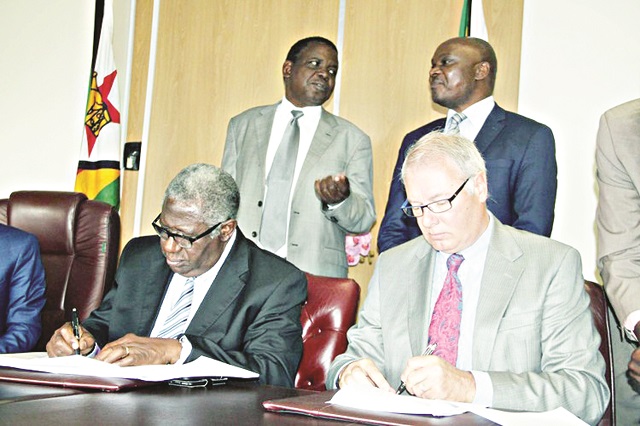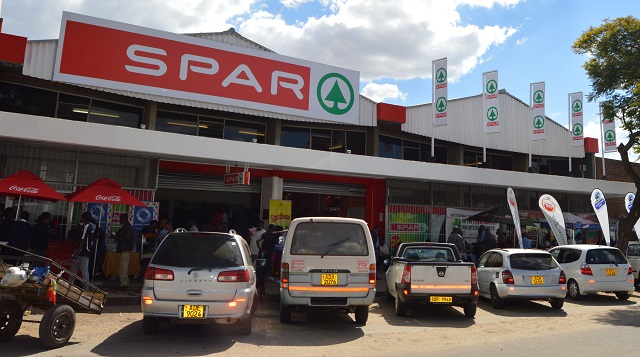Zimbabwe seals platinum refinery deal


Mines and Mining Development Minister Walter Chidhakwa (right back row), his deputy Fred Moyo witness as Zimbabwe Mining Development Corporation board chairman David Murangari and Kelltech director Keith Liddel seal a platinum refinery deal in Harare yesterday
Harare Bureau
THE Government yesterday signed an agreement with Australian company, Kelltech, for construction of a $300 million platinum refinery just about two months after Cabinet approved the project.
Kelltech will form a joint venture company with State-owned Zimbabwe Mining Development Corporation, which signed the agreement on behalf of Government, and local partner Golden Sparrow.
The refinery will significantly increase platinum export earnings.
The platinum refinery would be built for between $200 million and $300 million. Kelltech would provide the funding for the plant.
Construction work is expected to take 24 months from ground breaking, resulting in a facility that will give Zimbabwe capacity to refine its platinum instead of exporting a predominantly raw mineral.
The refinery plant will have capacity to separate bases metals; nickel, cobalt and copper from the precious metals; PGMs and gold. With this plant, platinum, for which Zimbabwe has the world’s second biggest known reserves, could become the game changer.
Minister Chidhakwa said when Kelltech approached Government with the proposal for a platinum refinery, which uses the new Kell technology, Government advised his ministry to work with the firm to test the viability and feasibility of the process.
For a period of 24 months, Government and a few private sector metallurgists were assigned to work with Kelltech in testing the kell technology, at a pilot plant in Australia, and concluded that the process was practically and commercially viable. Kelltech was then invited to make a presentation to Cabinet.
“We arranged for them to make a presentation during a special session of the Cabinet on the 28th of March. After the presentation, Cabinet discussed the presentation and was satisfied that it was something we could look at. And so, the project was authorised or approved on that particular date,” he said.
Minister Chidhakwa said that the new joint venture company would be owned 49 percent by Kelltech, 30 percent by ZMDC and 21 percent by Kelltech’s indigenous partner, Golden Sparrow. The mines minister added that it had been agreed Kelltech will design, construct and fund construction of the plant.
The PGMs refinery plant will be built in modular designs with initial capacity to process 300 000 tonnes of platinum concentrate. PGMs account for nearly half of mineral export earnings.
Kelltech director Keith Liddel said his company was pleased with the opportunity to work with Government in building a facility to beneficiate local platinum in order to optimise returns from PGMs.
Minister Chidhakwa said Government would require platinum miners to deliver their material to the facility for beneficiation at market prices. Legislation will be crafted to enforce the policy.
Zimbabwe currently has capacity to produce about 420 000 ounces of platinum group metals from its three active mines namely Impala Platinum owned Unki, Sibanye’s Zimbabwe unit Mimosa Mining Company and Anglo American owned Unki Mine.
Minister Chidhakwa said that once there was local capacity and facilities to process and refine platinum internally, Government would not allow local producers to export raw PGMs. Government gave platinum producers until 2018 to build a refinery or be subjected to a statutory 15 percent raw export levy.
Former Mines Minister Dr Obert Mpofu in 2012 gave the miners a two-year ultimatum to build refineries or face a raw exports ban. However, the miners argued it was not economically viable, as volumes above 500 000oz were required to justify the investment.
Mr Liddel said their technology used less power than earlier technology. Country head Mr Chris Showalter said it would cost $6,7 billion, over 15 years, to build a similar facility using old technology. Local miners contend over $3,5 billion is needed for a refinery.
“At Kelltech, we are very pleased and honoured to be able to provide a full beneficiation solution to Zimbabwe for the production of its platinum group metals. This initiative will provide the indigenisation solution that Zimbabwe has been looking for, for its platinum industry for many years,” Mr Liddel said.
“This is because the indigenisation will now happen at the concentrate level rather than at the mining level and we are very pleased that we can kill two birds with one stone; doing full beneficiation and (fulfil) indigenisation (requirements). We look forward to the construction of our kell (technology) plant in Zimbabwe.”
The first stage in kell is pressure oxidation, to leach out the base metals. The second is a heat treatment, during which the PGMs leach out. Mr Liddel said the kell technology uses a lot less electricity.
Contrary, energy intensive traditional methods require the creation of a flotation concentrate, put into a smelter which uses 1 000 kilowatts per tonne of concentrate, then send to a base metals refinery, and finally to a platinum group metals refinery.











Comments